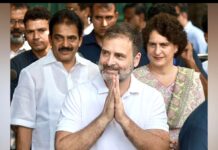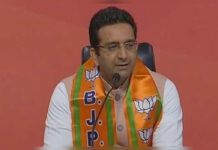The Supreme Court on Monday extended the interim stay on defamation proceedings against Congress MP Shashi Tharoor in relation to his controversial “scorpion on Shivling” remark targeting Prime Minister Narendra Modi in 2018. The case, filed by BJP leader Rajiv Babbar, accuses Tharoor of hurting religious sentiments with the metaphor.
A bench comprising Justices Hrishikesh Roy and SVN Bhatti directed that the interim stay on the trial court proceedings continue, while granting four weeks’ time to the Delhi Police and Babbar to file their responses to Tharoor’s plea challenging the defamation charges. The bench stated, “The interim order (of stay on the defamation proceedings) to continue.”
The Delhi Police’s counsel argued that the key issue in the case was whether the complainant, Babbar, could be considered an aggrieved party in the context of the alleged defamation. Babbar claims Tharoor’s remarks insulted both the Prime Minister and his religious beliefs.
The defamation case traces back to a public statement Tharoor made in October 2018, where he cited an unnamed RSS leader who compared Modi to “a scorpion sitting on a Shivling.” Tharoor described it as an “extraordinarily striking metaphor,” which prompted Babbar to file the criminal defamation complaint.
Tharoor sought to have the trial court’s April 27, 2019, order summoning him as an accused overturned. The Congress leader approached the Supreme Court after the Delhi High Court, on August 29, 2023, refused to quash the defamation proceedings. The High Court had noted that the “scorpion on Shivling” metaphor was “despicable and deplorable,” asserting that the remarks defamed not only the Prime Minister but also members of the ruling Bharatiya Janata Party (BJP).
In an earlier ruling on September 10, the Supreme Court had issued an interim stay on the trial court proceedings, allowing Tharoor time to appeal. The apex court has now sought responses from both Babbar and the Delhi Police before proceeding with the case, with the next hearing scheduled for four weeks later.
The case continues to draw attention due to its political implications, with Tharoor’s defense highlighting freedom of speech, while Babbar’s complaint emphasizes the offensive nature of the metaphor.








clomid for sale in usa buy cheap clomiphene tablets buying clomiphene how to get clomid how can i get clomiphene generic clomiphene pill can i order clomid without insurance
More articles like this would frame the blogosphere richer.
This is a theme which is near to my fundamentals… Many thanks! Unerringly where can I lay one’s hands on the connection details for questions?
purchase azithromycin pill – how to buy floxin metronidazole for sale
purchase rybelsus sale – semaglutide 14mg brand order periactin
cost motilium 10mg – flexeril 15mg us cyclobenzaprine 15mg generic
augmentin order – atbioinfo purchase ampicillin online cheap
buy nexium 40mg for sale – nexiumtous buy esomeprazole paypal
order generic meloxicam 15mg – https://moboxsin.com/ order meloxicam 15mg online
buy prednisone 5mg sale – corticosteroid order prednisone 10mg pills
cost amoxil – amoxicillin generic buy amoxil without a prescription
brand fluconazole – buy diflucan online cheap diflucan generic
cenforce tablet – https://cenforcers.com/ purchase cenforce without prescription
cialis a domicilio new jersey – ciltad gn buy generic tadalafil online cheap
cost ranitidine 150mg – https://aranitidine.com/# zantac 150mg ca
tadalafil 20mg (generic equivalent to cialis) – https://strongtadafl.com/ cialis online without pres
I’ll certainly bring back to read more. sitio web
I am in point of fact enchant‚e ‘ to glance at this blog posts which consists of tons of useful facts, thanks object of providing such data. https://ursxdol.com/azithromycin-pill-online/
I am in fact delighted to glance at this blog posts which consists of tons of useful facts, thanks towards providing such data. https://ondactone.com/product/domperidone/
More articles like this would pretence of the blogosphere richer.
https://doxycyclinege.com/pro/levofloxacin/
This website absolutely has all of the information and facts I needed adjacent to this subject and didn’t know who to ask. https://clients1.google.co.je/url?q=https://www.startus.cc/company/stockholm
More posts like this would create the online elbow-room more useful. http://wightsupport.com/forum/member.php?action=profile&uid=21300
order generic forxiga – https://janozin.com/ order dapagliflozin 10mg without prescription
how to buy orlistat – https://asacostat.com/# xenical 60mg uk
Facts blog you possess here.. It’s intricate to espy strong calibre script like yours these days. I truly appreciate individuals like you! Rent vigilance!! http://3ak.cn/home.php?mod=space&uid=230353
You can keep yourself and your family nearby being cautious when buying prescription online. Some pharmaceutics websites control legally and put forward convenience, secretiveness, rate savings and safeguards over the extent of purchasing medicines. buy in TerbinaPharmacy https://terbinafines.com/product/tadapox.html tadapox
With thanks. Loads of conception! TerbinaPharmacy
I’ll certainly bring back to skim more.
Với giao diện mượt mà và ưu đãi hấp dẫn, MM88 là lựa chọn lý tưởng cho các tín đồ giải trí trực tuyến.
Với giao diện mượt mà và ưu đãi hấp dẫn, MM88 là lựa chọn lý tưởng cho các tín đồ giải trí trực tuyến.
iwin – nền tảng game bài đổi thưởng uy tín, nơi bạn có thể thử vận may và tận hưởng nhiều tựa game hấp